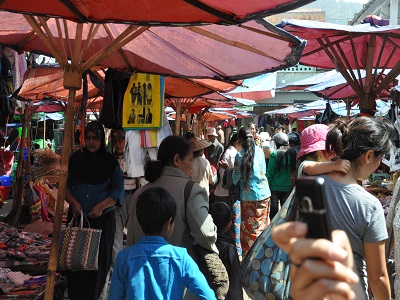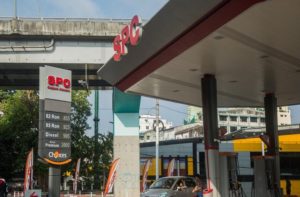Yangon-based Golden Myanmar Airlines Public Co received permission from the Myanmar Investment Commission (MIC) on April 5 to take part in the “importation, storage, distribution, transportation and into plane fueling of jet fuel”, according to the list of permitted enterprises from the Directorate of Investment and Company Administration (DICA).
FMR Research & Advisory research manager Chris Markey commented that the move should “alleviate some of the margin pressure faced by Myanmar’s domestic airlines” and bring competition to the jet fuel distribution market.
The new venture would be located at airports in Mandalay, Tachileik, Kawthaung, Nyaung Oo, Heho, Sittwe and Myitkyina, DICA’s announcement stated. It would also have a jetty terminal at Thilawa in southern Yangon. However, Yangon International Airport (YIA) is not included.
A spokesperson of YIA’s operator Yangon Aerodrome Co said they have not received an application from Golden Myanmar Airlines to provide jet fuel services, and that they will assess such applications if there are any.
Since YIA is the base for most domestic airlines, observers say there is yet to be a business case for distributing fuel in all but Yangon’s airports.
Myanmar Competition Commission member U Thuta Aung argued last month that the “lack of real competition in fuel provision at Yangon International Airport” is “the elephant in the room” for the aviation industry.
Until 2015, state-owned Myanma Petroleum Products Enterprise dominated the fuel market. At present, National Energy Puma Aviation Services (NEPAS), a joint venture formed by state-owned Myanma Petroleum Products Enterprise and Singapore’s Puma Energy in 2015, is the only aviation fuel supplier in the country. NEPAS operates at 11 airports, including YIA.
Local players are struggling because of overcompetition in such a small market as well as the fuel import cartel, some industry observers say. Five Myanmar airlines have folded during the past two years. Asian Wings Airways was suspended on January 1 after Air Mandalay, Air Bagan, Apex airline and FMI Air.
“Myanmar has the most expensive aviation fuel in the ASEAN region, according to U Hlaing Bwar, a long-time aircraft engineer. Since fuel is one of the key variable costs in providing airline services, for all the strength our domestic carriers may develop, they will not flourish if undermined by disproportionate fuel costs,” U Thuta Aung said in a Myanmar Times letter.
Mr Markey, who has produced market reports on Myanmar aviation industry, said a competitive fuel market would lower costs for the struggling companies.
“Domestic airlines have continually claimed jet fuel prices are high and exacerbate financial struggles faced by the airlines, which are already hampered by low passenger load factors and a number of other headwinds.”
There are currently five private and one state-owned carriers in Myanmar.
 Ooredoo Myanmar has signed an agreement with ZTE to develop together on 5G network deployment as part of the operator’s network modernization program.
Ooredoo Myanmar has signed an agreement with ZTE to develop together on 5G network deployment as part of the operator’s network modernization program.



 Japanese retail giant Aeon opened a hypermarket in Myanmar with the aim of seeking to cash in on the growing retail sector in the emerging economy.
Japanese retail giant Aeon opened a hypermarket in Myanmar with the aim of seeking to cash in on the growing retail sector in the emerging economy. Telenor Myanmar, CB Bank and Visa last week launched a new CB-Telenor Visa card in Myanmar, days after the Central Bank of Myanmar raised annual credit card interest rates to 20pc from 13pc to put a lid on runaway credit card debt in April.
Telenor Myanmar, CB Bank and Visa last week launched a new CB-Telenor Visa card in Myanmar, days after the Central Bank of Myanmar raised annual credit card interest rates to 20pc from 13pc to put a lid on runaway credit card debt in April. MTB is one of five sector-specific banks granted a banking license by the Central Bank of Myanmar (CBM) in 2017. It is founded by a public tourism company. Initiated during U Thein Sein’s government, K2 billion was raised to finance the MTB to help promote the tourism sector, but it failed to get the necessary approvals from relevant authorities.
MTB is one of five sector-specific banks granted a banking license by the Central Bank of Myanmar (CBM) in 2017. It is founded by a public tourism company. Initiated during U Thein Sein’s government, K2 billion was raised to finance the MTB to help promote the tourism sector, but it failed to get the necessary approvals from relevant authorities. Telenor Myanmar is now the largest 4G/LTE network in Myanmar, covering more than 300 townships with over 6100 LTE sites nationwide, due to the telecommunications services provider from Telenor and that’s almost all the townships in Myanmar.
Telenor Myanmar is now the largest 4G/LTE network in Myanmar, covering more than 300 townships with over 6100 LTE sites nationwide, due to the telecommunications services provider from Telenor and that’s almost all the townships in Myanmar. Air KBZ will resume flights to Myeik and Sittwe from May 1 onwards.
Air KBZ will resume flights to Myeik and Sittwe from May 1 onwards.  Myanmar has opened the door to the first private company to operate an aviation fuel business, potentially ending a state-backed monopoly in the fuel distribution market.
Myanmar has opened the door to the first private company to operate an aviation fuel business, potentially ending a state-backed monopoly in the fuel distribution market.

